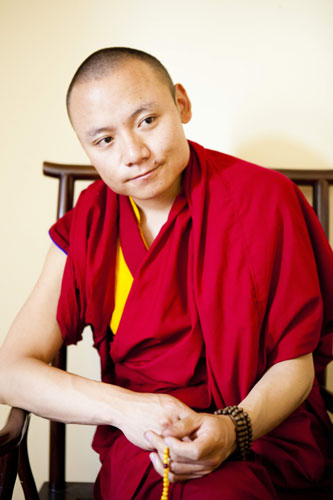
Tenzin Dorje has been called a 'modern Living Buddha'. Liu Wei interviews him in Lhasa and finds out more.
Tenzin Dorje's iPad skin is red, the same color as his chougu or traditional Buddhist garb. His tablet contains Buddhist music, hip-hop and other English-language songs.
Dorje is better known in Lhasa as the Sixth Balok Rinpoche. Rinpoche is the title given to a tulku - a reincarnated "Living Buddha". For someone spiritual, the topics he touches on during the interview appear rather secular.
"I am a Libra, what is your star sign?" says the young man who will celebrate his 30th birthday in mid-September. He went on to talk about his favorite football star, who is Ronaldo de Assis Moreira, emphasizing that he is not the same as "the pretty-face Cristiano Ronaldo".
 |
|
Tenzin Dorje, 30, a reincarnated Living Buddha at Yangri Gar Monastery in Lhasa, is called a "modern Living Buddha" for his unconventional behavior and lifestyle. Provided to China Daily |
Also unlike the general perception of a "Living Buddha", he posted photos of himself wearing a pair of chic sunglasses on his micro blog, attracting comments from his 5,000 followers.
His unconventional behavior has resulted in some media calling him a "modern Living Buddha", which he feels is an awkward title.
Dorje does not remember very clearly how he was recognized as a Rinpoche. He recalls, however, that when he was about 8, many old lamas came to his home and talked to his father, also a Rinpoche who resumed secular life during the "cultural revolution" (1966-76). Soon after, he was recognized as a "Living Buddha".
Indeed, not everyone understands his lifestyle. He says sometimes when he walks into cinemas or restaurants, he is greeted by unfriendly faces.
"How can you be here? How can a lama use an iPhone?" These are some of the questions he faces.
"But the thing is, I can input Tibetan language easily onto my iPhone," he says.
Many lamas in Lhasa use iPhones for the same reason, he adds, and they make good use of the various apps to better practice Buddhism.
Dorje says he has also built an online community on learning Mandarin. One of his fellow monks built another online community with a social instant messaging app called weixin, in which 20 lamas from different monasteries can debate sutras at the same time.
"In the past, Living Buddhas explained sutras in monasteries, but today some of them use modern technology to spread Buddhism to a wider group. I don't see anything wrong with it," he says.
Being a Rinpoche, Dorje has the opportunities to receive a good education. In Tibet, there are about 2,000 "Living Buddhas", mostly accomplished in Buddhism, arts, music or medicine.
Dorje learned music and arts from senior lamas. He now teaches English and arts in the Tibet Buddhism University in Lhasa.
His English language used to be terrible. Then, nine years ago, an incident prompted him to improve it. He was an interpreter then. But he failed to do a good job during a meeting between his mentor and a professor from the University of Virginia, and needed the help of a student of the professor.
He was so embarrassed that he decided to work hard to improve his language skill. He learned from established lamas, listened to radio programs and practiced every day by speaking with friends in English.
"I wanted to say more than 'hello' and 'welcome to Tibet' when talking to international friends, and discuss Tibetan culture in a way they understand," he says.
Dorje has since taken charge of the English introduction of the Buddha statues in Drigung Til Monastery in Lhasa, and finished translating a Tibetan book about sky burial.
Senior Tibetan music producer Ermao has worked with Dorje on a 10-minute TV documentary on Buddhist music. The two are planning to release a CD of gurlu or mgur, a kind of lyrical poetry of Tibetan Buddhism.
Ermao says he would be happy to see Dorje spend more time in monasteries, either contemplating or studying sutras, but would not judge his current lifestyle.
"In Tibet, there are various types of Living Buddhas," he says. "Some of them choose to live only in monasteries, while others prefer living with the community. But, as long as they are not addicted to certain hobbies and entertainment, I think it is OK for them to learn how ordinary people live and work."
Ermao says some girls have expressed their admiration for Dorje, but the latter has rejected them politely, saying: "I cannot be yours because I belong to Sakyamuni (founder of Buddhism)."
Ermao says Dorje has told him that he won't resume secular life. "He told me that his identity now is the most honorable and the best way of life for him."
Dorje is now on a mission - he is trying to raise enough money to renovate Yangri Gar Monastery, where he studied and grew up.
Yangri Gar is not a big monastery in Lhasa, which boasts of many famous religious sites such as Jokhang and Ramoche monasteries. It was built 500 years ago and its assembly hall needs a facelift. Local government has offered a subsidy of about 1 million yuan ($147,000), but it is still not enough.
"Rinpoches are born with missions," he says. "My mission at this moment is to repair the monastery. All the obstacles in the process are part of my practice of Buddhism."
Contact the writer at liuw@chinadaily.com.cn.







